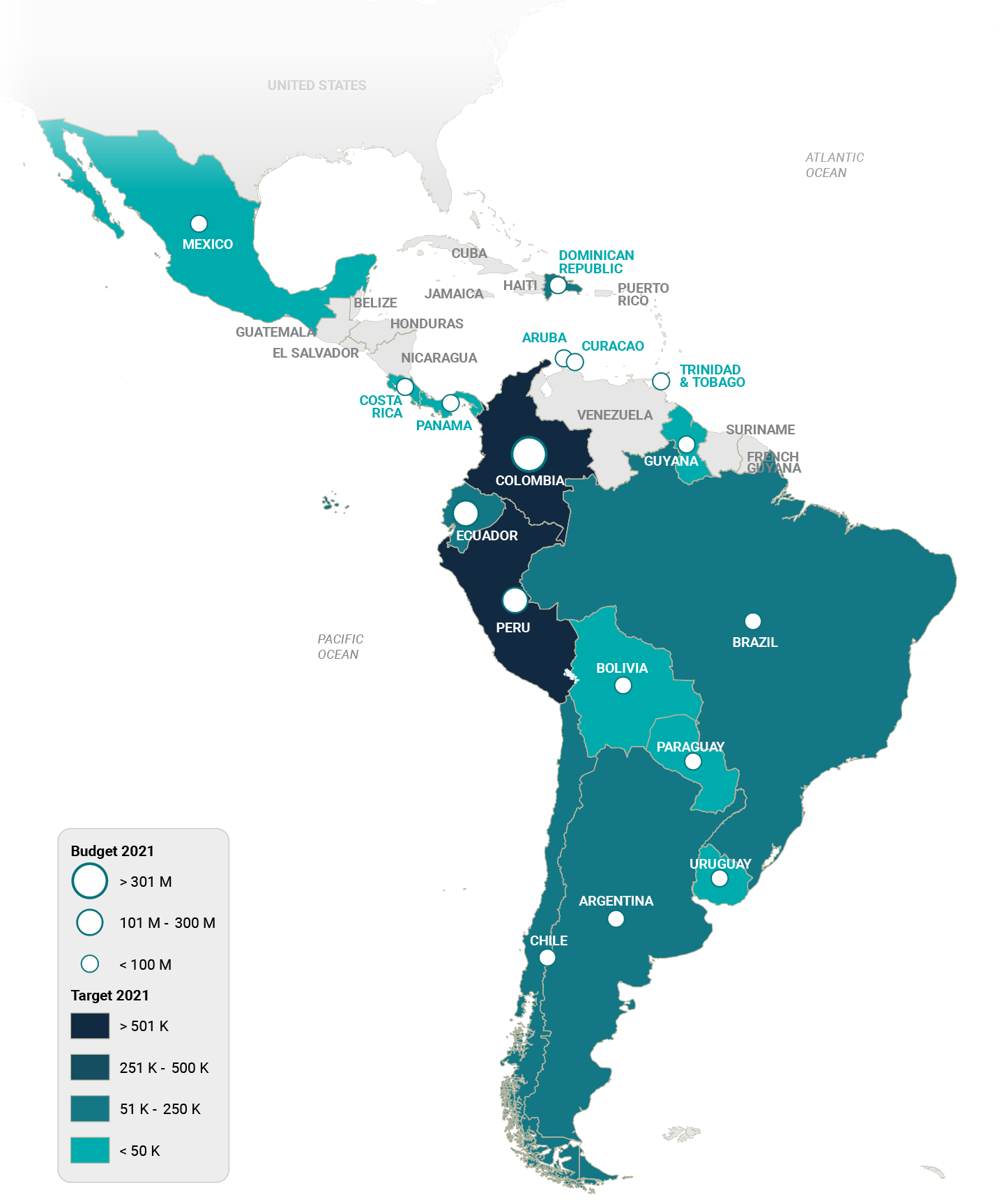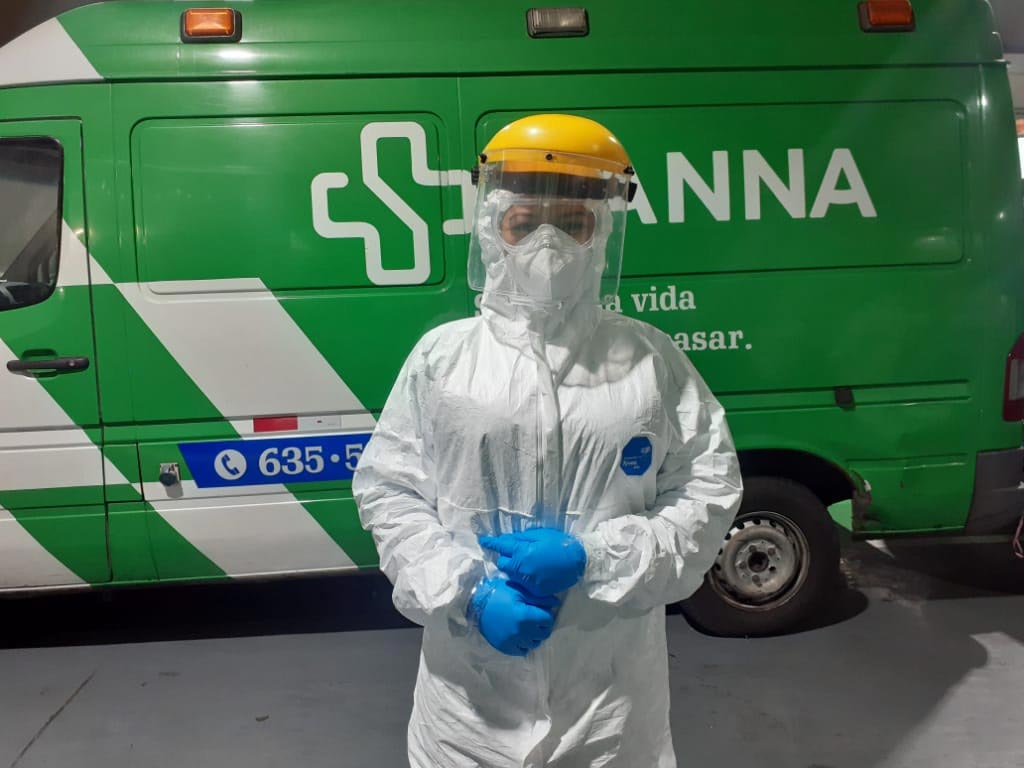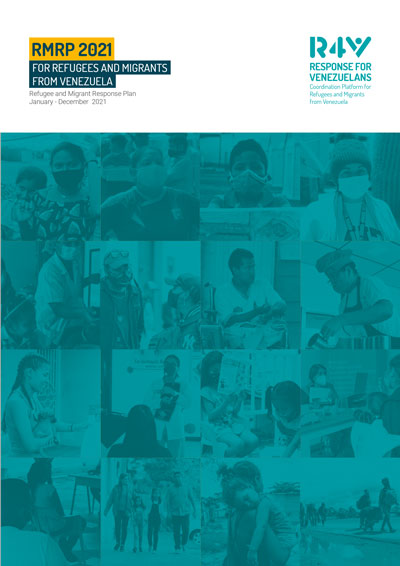Venezuelan family on the move after being evicted from their house in Soacha, Colombia. © NRC/Nadège Mazars
“Despite several complexities posed by the uncertainty and deepening of the humanitarian crisis, thanks to the sustained engagement and work of all partners, the RMRP 2021 provides a clear articulation of how to complement host government’s efforts.”
The exodus of Venezuelans is the largest in the recent history of Latin America and the Caribbean. As of November 2020, more than 5.4 million refugees and migrants from Venezuela are outside their country of origin, with 4.6 million in the region alone.
In this context, the Refugee and Migrant Response Plan 2021 is the result of field-driven planning, bringing together 159 appealing organizations in 17 countries, in consultation with host governments, civil society and faith-based organizations, local communities, donors, as well as the refugees and migrants themselves, with the common objective of addressing the overarching humanitarian, protection and socioeconomic integration needs of refugees and migrants from Venezuela.
REGIONAL RMRP AT A GLANCE

Requested funding and beneficiaries targeted

By national and sub-regional platform

© NRC/Nadège Mazars
Where do we stand
The political, human rights and socio-economic developments in Venezuela have led to the largest movement of refugees and migrants in the recent history of Latin America and the Caribbean. As of November 2020, of the approximately 5.4 million refugees and migrants from Venezuela outside of their country of origin, some 4.6 million are hosted in the region alone, including an estimated 1 million with an irregular status. Despite the devastating and ongoing socioeconomic and human impact of COVID-19, countries in Latin America and the Caribbean have continued to show great solidarity towards Venezuelans and to facilitate access to basic rights and lifesaving services as well as supporting their integration.
The already precarious situation of many refugees and migrants from Venezuela and affected host communities is reaching alarming levels, as national and local capacities have been dangerously strained due to the continued impact of COVID-19, threatening the overall social fabric in the 17 countries covered by the Regional Refugee and Migrant Response Plan. In a region characterized by high levels of informal labour, the implementation of measures aiming to curb the spread of COVID-19 (including border closures, lockdowns, curfews and other quarantine measures) has had a disproportionately grave impact on refugees and migrants. Without savings or alternative social safety nets, the loss of employment has resulted in many being unable to cover basic needs or access vital services.
The Regional Response
Humanitarian worker teaches Venezuelan child and his mother how to wash hands to prevent COVID-19 in Bucaramanga, Colombia. ©Oxfam/Mario Niño
As a result of the complex economic and political outlook, increased dependency on emergency humanitarian assistance in the areas of health, shelter, food, Water, Sanitation and Hygiene (WASH), as well as access to education, protection and integration is reflected in the increased needs outlined in the RMRP 2021. The COVID-19 pandemic has also resulted in a dramatic increase of reported cases of gender-based violence (GBV) and mental health needs, while leading to widespread food insecurity, rising levels of malnutrition and growing destitution especially among the most vulnerable, namely unaccompanied and separated children (UASC), single-headed households, women and girls at risk of GBV and trafficking, the elderly, those with chronic diseases, the LGBTQI+ community and those in situations of irregularity.
Xenophobia and stigmatization are on the rise, often based on negative perceptions associated with fear of the spreading virus and rising rates of evictions and homelessness, leading to a vicious cycle of irregularity, vulnerability, and stigmatisation.
What’s the RMRP?
Orliannis Sophia and Jesuatny look through the contents of their hygiene kit.
©Plan International/Gina Piñeros
The RMRP was first developed in 2018 (implemented throughout 2019) as a strategic regional response plan and advocacy tool to support country and sub-regional operations and to ensure the most pressing humanitarian, protection and integration needs of refugees and migrants from Venezuela, as well as those of host communities, were met.
The RMRP 2021 intends to build upon the best practices and lessons learned from 2020, presenting a more comprehensive plan, for an even more effective, coordinated and holistic response for refugees and migrants from Venezuela in Latin America and the Caribbean.
As in previous years, the RMRP 2021 provides a comprehensive analysis of the population movement dynamics to be expected for 2021 and the corresponding needs of refugees and migrants from Venezuela as well as of affected host communities. It further describes the response strategies and priority activities and indicates the financial needs of all partners of the Inter-Agency Coordination Platform to be able to continue assisting the population in need in an effective and coordinated manner.

Carmen is one of the many coronavirus heroes. After she left Venezuela, Carmen spent more than two years working as a waitress, a receptionist and a sales attendant until she was able to validate her medical qualifications in Peru. © UNHCR/ Carmen Parra
Reflective of its inter-agency and multisectoral character, the RMRP 2021 is based on joint needs assessments carried out by RMRP partners at national and sub-regional levels on an ongoing basis, and on continuous exchanges with host governments, civil society actors and affected populations. The planning phase started in August 2020 after consultations with key strategic partners of the Platform, host governments, as well as the donor community. The RMRP 2021 is the result of an intra-regional field-driven strategic planning process, bringing together 159 appealing organizations, in consultation with all host governments, local communities and authorities, United Nations agencies, civil society, including international and national non-governmental organizations and faith-based organizations, the Red Cross Movement, the donor community, as well as consultations with refugees and migrants from Venezuela.
The structure of the RMRP 2021 reflects the sectoral set-up of the Regional Inter-Agency Coordination Platform (R4V) and all strategies and activities articulated in this Plan have been reviewed and cleared by the different Platforms and Sectors, both at regional and national/sub-regional levels, and have been elaborated in complementarity with the work of host governments.
What are we focusing on in 2021?
An elder Venezuelan woman digitally signing after receiving information and assistance on COVID-19 prevention. ©MercyCorps/Sol Torres
The RMRP 2021 strives to maintain a balance between responses focusing on immediate humanitarian and protection assistance, and activities that bridge the humanitarian-development-peace nexus by responding to the longer-term resilience and integration needs of affected populations and host communities.
To enhance this complementarity between humanitarian action and development support, the Regional, Sub-regional and National Platforms will to serve as a forum for convening humanitarian and development partners for efficiently coordinated assistance. This approach is in line with the UN Secretary-General’s Agenda for Humanity, the UN Development System Reform, the Grand Bargain global commitments and the principles of the New Way of Working, calling for collective and coherent support to reduce people’s needs and vulnerabilities, based on comparative advantages of 159 humanitarian and development RMRP actors across the region.
RMRP partners at the regional and national levels have continued to show commitment and dedication throughout the preparation of this Plan. The RMRP 2021 intends to build upon the best practices and lessons learned from 2020, presenting a more comprehensive plan for 2021, for an even more effective, coordinated and holistic response for refugees and migrants from Venezuela in Latin America and the Caribbean.
Bearing in mind the various political and socioeconomic developments unfolding in Venezuela as well as in numerous host states, and the ongoing impact of the COVID-19 pandemic, the outlook for 2021 remains particularly complex and fragile. These dynamics have been reflected throughout the planning exercise and in all chapters of this RMRP.
In this spirit, RMRP partners will continue to regularly and transparently report on implementation of activities under the RMRP dedicated monitoring and reporting framework and will continue to be highly responsive to newly arising challenges or changes impacting on refugees and migrants from Venezuela as well as affected host communities.
In 2021, the RMRP also seeks to complement and further strengthen the national and regional responses of governments, including specifically the Quito Process as the main technical regional intergovernmental coordination forum in which key policies towards refugees and migrants from Venezuela are discussed and adopted.
National/Sub-regional and sectorial downloads
RMRP 2021 partner organizations
100% Diversidad y Derechos
ACAPS
Acción contra el Hambre
Adventist Development and Relief Agency (ADRA)
AID FOR AIDS
Alianza por la Solidaridad
Americares Foundation
Asociación Civil Venezolana en Paraguay
Asociación Construyendo Caminos de Esperanza Frente a la Injusticia, el Rechazo y el Olvido (CCEFIRO)
1Asociación de Apoyo al Desarrollo APOYAR
Asociación de Jubilados y Pensionados Venezolanos en Argentina
Asociación de venezolanos en la República argentina (ASOVEN)
Asociación ILLARI-AMANECER
Asociación Manos Veneguayas
Asociación Mutual Israelita Argentina
Asociación Profamilia
Asociación Venezolana en Chile
Ayuda en Acción
Bethany Christian Services
Blumont
CAM
CARE
Cáritas Alemania
Caritas Brazil
Caritas Ecuador
Caritas Manaus
Caritas Rio de Janeiro
Caritas São Paulo
Caritas Switzerland
Center for Integrated Studies and Programs for Sustainable Development (CIEDS)
Center for Migration and Human Rights of the Diocese of Roraima (CMDH)
Centro de Atencion Psicosocial (CAPS)
Centro de Estudios y Solidaridad con América Latina (CESAL)
Cesvi
ChildFund Internacional
Churún Merú Association
Colonia Foundation of Venezuelans in the Dominican Republic (FUNCOVERD)
Comisión Argentina para Refugiados y Migrantes (CAREF)
Comité Internacional para el Desarrollo de los Pueblos (CISP)
Comité permanente por la defensa de los derechos humanos (CDH)
Compassiva
Consejo Interreligioso del Perú – Religiones por la Paz
COOPI – Cooperación Internacional
Cruz Roja Argentina
Cruz Roja Colombia
Cruz Roja Ecuador
Cuso Internacional
Danish Refugee Council (DRC)
Deutsche Gesellschaft für Internationale Zusammenarbeit (GIZ)
Diakonie Katastrophenhilfe
Diálogo Diverso
Dominican Institute for Integrated Development
Duendes y Ángeles Foundation
Federación Luterana Mundial
Foro Salud Callao
Foundation of the Americas (FUDELA)
Foundation of Venezuelan Emigrants (FEV)
Fundación Alas de Colibrí
Fundación AVSI
Fundación Comisión Católica Argentina de Migraciones (FCCAM)
Fundación CRISFE
Fundación FIDAL
Fundación Halü Bienestar Humano (HALU)
Fundación Scalabrini Bolivia
Fundación SES
Fundación Tarabita
Globalizate Radio
Guarulhos Human Rights Defense Center (CDDH)
Heartland Alliance International (HAI)
Hebrew Immigrant Aid Society (HIAS)
HELVETAS Swiss Intercooperation
Human Rights Defence Curaçao
Humanity & Inclusion
Humans Analytic
I know my rights
iMMAP
IMPACT Initiatives (REACH)
Inmigrante Feliz Association
Institute for Migration and Human Rights (IMDH)
Instituto Félix Guattari
International Federation of the Red Cross (IFRC)
International Labour Organization (ILO)
International Organization for Migration (IOM)
International Rescue Committee (IRC)
INTERSOS
IPANC
Jesuit Service for Migrants and Refugees (JSMR)
Joint United Nations Programme on HIV/AIDS (UNAIDS)
Kimirina
Latin American Network of Non-Governmental Organizations of Persons with Disabilities and their Families (RIADIS)
LGBT+ Movement Brazil
Malteser International
MedGlobal
Medical Teams International
Médicos del Mundo
Mercy Corps
Mirares
Misión Scalabriniana – Ecuador
Nice Institute
Norwegian Refugee Council (NRC)
Organización de Estados Iberoamericanos para la Educación, la Ciencia y la Cultura (OEI)
Organización de las Naciones Unidas para la Alimentación y la Agricultura (FAO)
Organización Fuerza Internacional de Capellanía DDHH y DIH OFICA ICC
OXFAM
Panamerican Development Foundation (FUPAD)
Panamerican Health Organization/World Health Organization (PAHO/WHO)
Parroquia Ntra Sra Asunción y Madre de los Migrantes
Pastoral de Movilidad Humana – Conferencia Episcopal Peruana
Peace for Development
Plan International
Project HOPE
Red de Investigaciones Orientadas a la Solución de Problemas en Derechos Humanos (RIOSP DDHH)
Red regional LGTBI+
RET International
Salú pa Tur Foundation
Samaritan’s Purse
Save the Children International (SCI)
Scalabrini International Migration Network
Sección Peruana de Amnistía Internacional
Servicio Jesuita a Migrantes (SJM)
Servicio Jesuita a Refugiados (SJR)
Solidarites International/Premiere Urgence Internationale (Consorcio de SI y PUI)
SOS Children’s Villages
SPM – Serviço Pastoral dos Migrantes Nacional
SPM-NE – Serviço Pastoral dos Migrantes do Nordeste
Stichting Slachtofferhulp Curaçao
Stima Foundation
Swisscontact
Tearfund
Terre des hommes Lausanne
United Nations Children’s Fund (UNICEF)
United Nations Development Programme (UNDP)
United Nations Educational, Scientific and Cultural Organization (UNESCO)
United Nations Entity for Gender Equality and the Empowerment of Women (UNWOMEN)
United Nations High Commissioner for Refugees (UNHCR)
United Nations Office for Project Services (UNOPS)
United Nations Office of the High Commissioner for Human Rights (OHCHR)
United Nations Office on Drugs and Crime (UNODC)
United Nations Population Fund (UNFPA)
United Nations Programme for Human Settlements (UN Habitat)
Universidad Católica del Uruguay (UCU)
Vale da Benção Educational and Charitable Association (AEBVB)
VenAruba Solidaria
VenEuropa
Venex Curacao Foundation
Vicaría de Pastoral Social Caritas
War Child
World Council of Credit Unions
World Food Programme (WFP)
World Vision (WV)
ZOA
We World GVC
Sesame Workshop
Servicio Ecuménico para la Dignidad Humana
Fundación de Ayuda Social de Las Iglesias Cristianas
Cruz Roja Uruguay
Cruz Roja Perú
AsociacIón Misioneros de San Carlos Scalabrinianos

